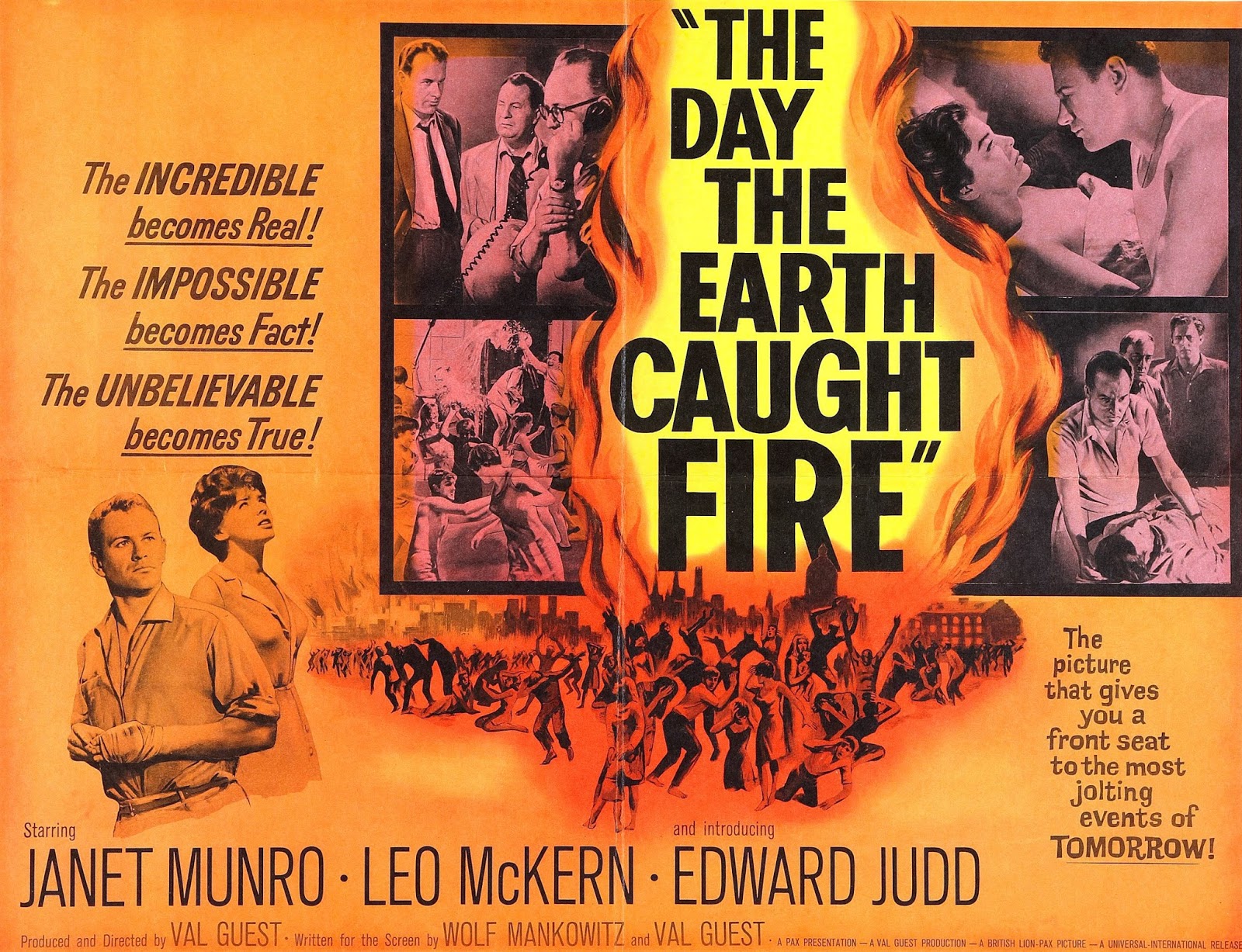
As Europe burns again in the latest major heat wave that is rapidly becoming an endemic pattern, I'm reminded of a 1961 British film. Created during the anti-nuclear boom of the postwar decades, it imagines a doomsday scenario where rampant atomic testing knocks the Earth out of orbit. Within days, temperatures spike, the Thames runs dry, and communal showers are built for emergency rationing as the planet enters a death spiral into the Sun.
In contrast to the "epic disaster" films of later decades (The Day After Tomorrow, &c.), this is startling in its simplicity and intimacy. The film takes place in London and brief forays into the country, following a limited cast of characters in a street view of the deteriorating climate. The candid, rapid-fire dialogue and limited setpieces give this a much more grounded feel than the cross-country spectacles of later movies—these are not larger-than-life heroes, but ordinary people trying, and increasingly failing, to go about their daily lives.
For a low-budget production, it is remarkably hard sci-fi. Take out the nuclear context and it becomes a chillingly prophetic view unto today's climate crisis, as sweltering temperatures and freak weather upend a population completely unprepared for the severity of the drought: people faint waiting in line at the water trucks; cities depopulate as desperate residents flee for remaining green pastures. Government cover-up cannot withstand the reality on the ground—when the Express, a sensationalist paper even in its heyday, announces the Earth is literally off its axis, people can believe it.
The film also captures the psychological impact on everyday citizens confronted with a crisis far beyond their control. In a mania reminiscent of the Renaissance hedonists, parched Londoners turn downtown into a water park, spraying down the streets and hurling buckets at complete strangers in reckless, if cathartic, defiance of the impending doom.
Today, only the most diehard denialists will refuse the reality of global warming outright, while the more savvy silvertongues couch their gaslighting in a rejection of anthropogenic climate change—as long as it's not our fault, we have no duty to act. Here too the film highlights the folly of man, and unwittingly predicts the paradox that a crisis engineered by irresponsible use of technology can only ultimately be solved through that same technology. In the film, this takes the form of a last-ditch attempt to nudge the planet back into orbit through counterbalancing detonations. As Gwynne Dyer explains in his 2008 book/lecture Climate Wars, we are past the point of a natural correction, but we have technological cheats to at least manage the transition to a less violent "new normal"—provided world nations can act in concert. In the film, the Americans and Soviets band together to do the right thing. In the present, where partisan posturing continues to trump basic facts, we're still waiting for leadership.
To the luck of the human race.
The Day the Earth Caught Fire by @Thorvald (El Thorvaldo)
Originally submitted as a journal on DeviantArt July 2022, this is half op-ed, half thematic review of the eponymous 1961 disaster film. I was immediately struck the first time I watched it how chillingly accurately it depicted runaway global warming from the lay perspective. Whereas the Epic Disaster flicks of the past two decades are overblown to the point of absurdity, firmly maintaining the fantasy barrier, this film is the (cough) slow burn that creeps up on everyone slowly until they realize they've already crossed the red line. While the nuclear premise now reads as outmoded, the plot itself feels even more relevant sixty years on.
Comments & Critiques (0)
Preferred comment/critique type for this content: Any Kind



Leave a Comment
You must be logged in and have an Active account to leave a comment.
Please, login or sign up for an account.